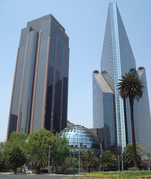Portal:Business
 Business is the practice of making one's living or making money by producing or buying and selling products (such as goods and services). It is also "any activity or enterprise entered into for profit." A business entity is not necessarily separate from the owner and the creditors can hold the owner liable for debts the business has acquired. The taxation system for businesses is different from that of the corporates. A business structure does not allow for corporate tax rates. The proprietor is personally taxed on all income from the business. A distinction is made in law and public offices between the term business and a company such as a corporation or cooperative. Colloquially, the terms are used interchangeably. (Full article...) Economics (/ˌɛkəˈnɒmɪks, ˌiːkə-/) is a social science that studies the production, distribution, and consumption of goods and services. Economics focuses on the behaviour and interactions of economic agents and how economies work. Microeconomics analyses what is viewed as basic elements within economies, including individual agents and markets, their interactions, and the outcomes of interactions. Individual agents may include, for example, households, firms, buyers, and sellers. Macroeconomics analyses economies as systems where production, distribution, consumption, savings, and investment expenditure interact, and factors affecting it: factors of production, such as labour, capital, land, and enterprise, inflation, economic growth, and public policies that have impact on these elements. It also seeks to analyse and describe the global economy. (Full article...) The Han dynasty (206 BC – 220 AD) of ancient China experienced contrasting periods of economic prosperity and decline. It is normally divided into three periods: Western Han (206 BC – 9 AD), the Xin dynasty (9–23 AD), and Eastern Han (25–220 AD). The Xin regime, established by the former regent Wang Mang, formed a brief interregnum between lengthy periods of Han rule. Following the fall of Wang Mang, the Han capital was moved eastward from Chang'an to Luoyang. In consequence, historians have named the succeeding eras Western Han and Eastern Han respectively.
 São Paulo is one of the largest cities in the world economically, and is expected to be the 6th largest in 2025. According to data of Fecomercio/SP, its gross domestic product (GDP) in 2017 was R$699.28 billion ($219.11B today). The biggest financial center in Brazil and one of the biggest financial centers in the world, São Paulo's economy is going through a deep transformation. Once a city with a strong industrial character, São Paulo's economy has become increasingly based on the tertiary sector, focusing on services and businesses for the country. The city is also unique among Brazilian cities for its large number of foreign corporations. Many analysts point to São Paulo as an important global city, even though this assignment can be criticized considering its serious problems of social exclusion and spatial segregation. Although being the most important financial centre of the country, São Paulo also presents a high degree of informality in its economy. (Full article...) "There used to be a lot of advice given to officials not to hide behind their titles. The very necessity for the advice showed a condition that needed more than advice to correct it. And the correction is just this—abolish the titles. A few may be legally necessary; a few may be useful in directing the public how to do business with the concern, but for the rest the best rule is simple: "Get rid of them." As a matter of fact, the record of business in general just now is such as to detract very much from the value of titles. No one would boast of being president of a bankrupt bank. Business on the whole has not been so skillfully steered as to leave much margin for pride in the steersmen. The men who bear titles now and are worth anything are forgetting their titles and are down in the foundation of business looking for the weak spots. They are back again in the places from which they rose—trying to reconstruct from the bottom up. And when a man is really at work, he needs no title. His work honours him. All of our people come into the factory or the offices through the employment departments. As I have said, we do not hire experts—neither do we hire men on past experiences or for any position other than the lowest. Since we do not take a man on his past history, we do not refuse him because of his past history. I never met a man who was thoroughly bad. There is always some good in him—if he gets a chance. That is the reason we do not care in the least about a man's antecedents—we do not hire a man's history, we hire the man. If he has been in jail, that is no reason to say that he will be in jail again. I think, on the contrary, he is, if given a chance, very likely to make a special effort to keep out of jail. Our employment office does not bar a man for anything he has previously done—he is equally acceptable whether he has been in Sing Sing or at Harvard and we do not even inquire from which place he has graduated. All that he needs is the desire to work. If he does not desire to work, it is very unlikely that he will apply for a position, for it is pretty well understood that a man in the Ford plant works."
The following are images from various business-related articles on Wikipedia.
Wikinews Economy and business portal
Urgent and important articles are bold
The following Wikimedia Foundation sister projects provide more on this subject:
Discover Wikipedia using portals |






































